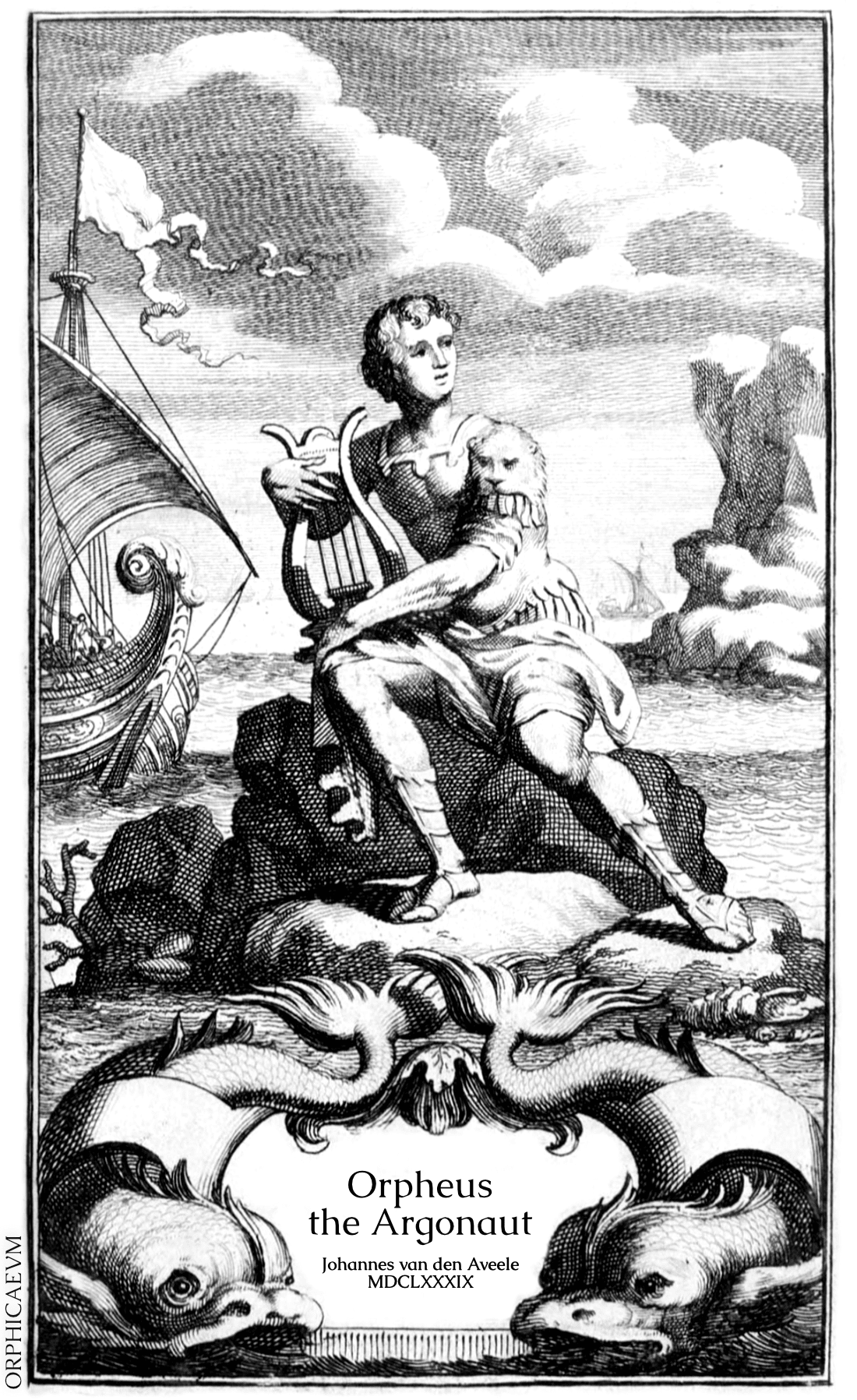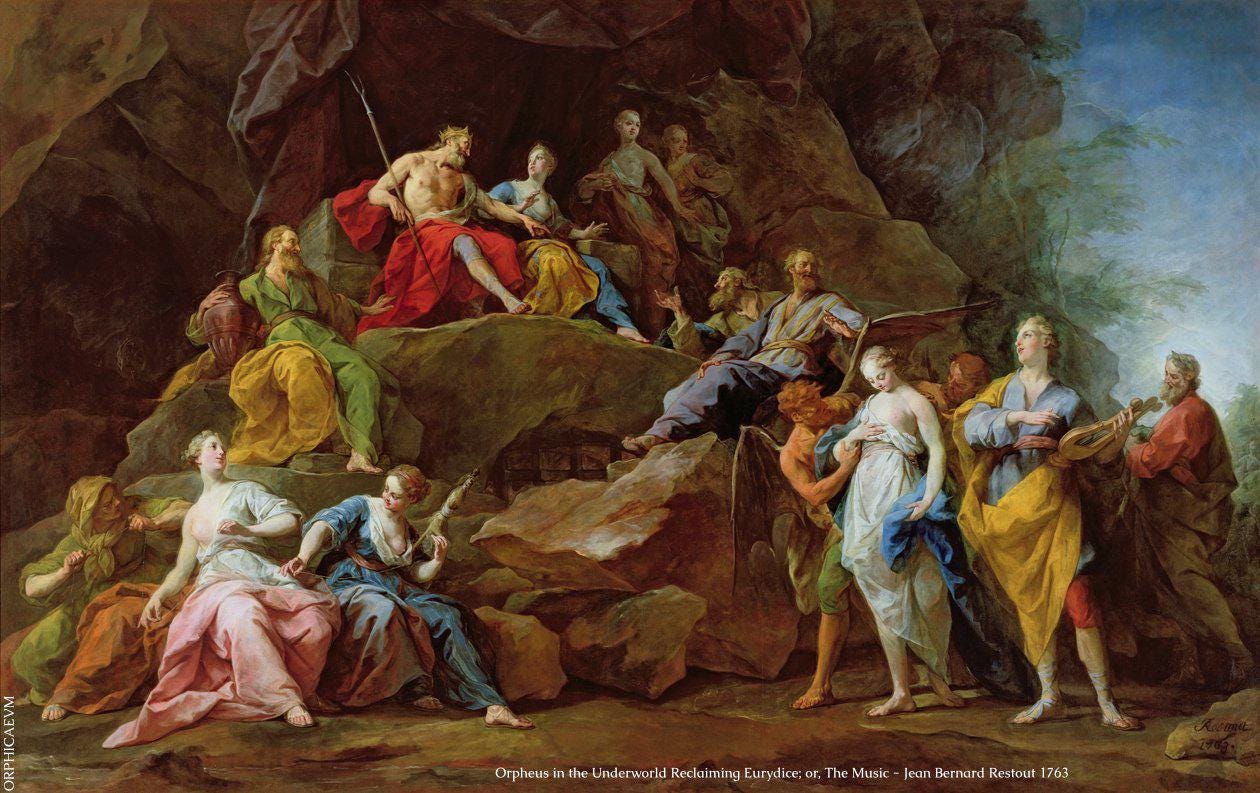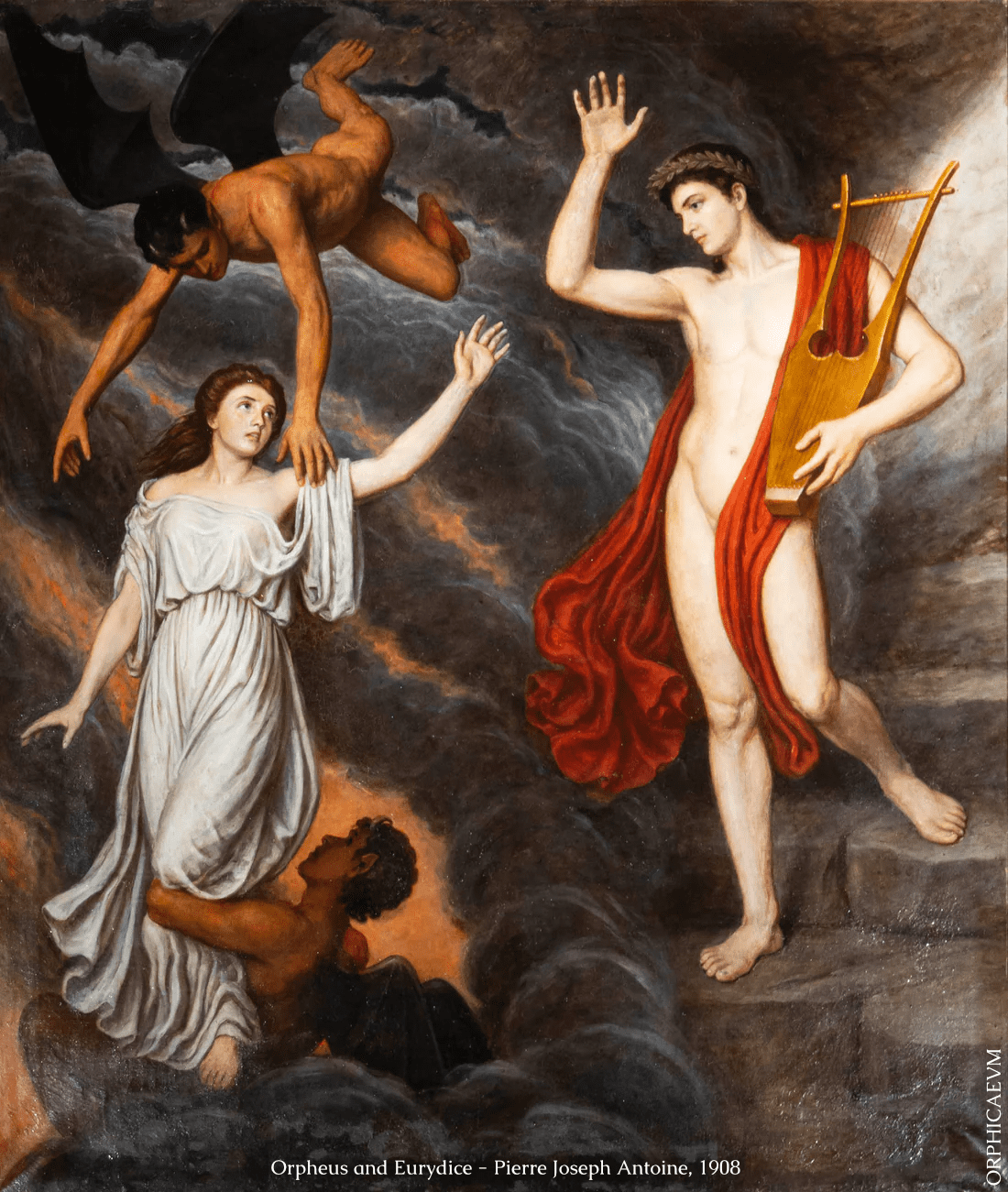Orpheus, Famous-in-Name
A Preview of Things-to-Come
We are hard at work on projects that are important for Orphicaeum. Rather than divide effort between the projects and the newsletter, it makes more sense to stay buried in the important work and to let the newsletter fall to the side while things settle into place. However, instead of completely foregoing this week’s newsletter or trying to rush something out half-heartedly, here is an excerpt from one of those projects. This post is not paywalled, so feel free to share it. If you’ve come here from somewhere else, please read about Who and What Orphicaeum is.
Orpheus, Famous-in-Name
The earliest discovered reference to Orpheus is a fragment from the poet Ibycus that only says the following two words: onomaklyton Orphēn, which means “Name-Famed Orpheus” or “Orpheus, Famous-in-Name”. Orpheus was famous indeed, cited by many ancient authors as being the first among the Greeks to learn the names and rites of the Gods.
Our religion is called “Orphism” because it is said to have been founded by Orpheus himself, and because the sacred texts and teachings are said to have been written by him. So then, it is only natural to begin our journey into Orphism by first becoming familiar with Orpheus.
The Life of Orpheus
The most common version of Orpheus’ story is that he was son of the Muse Calliope, and fathered by Oeagrus, King of Thrace. Some sources say, however, that his true father was the God Apollo. Orpheus is usually considered Thracian because of his mortal father, but Oeagrus and Calliope were married in Greece: specifically Pimpleia, which is at the foot of Mount Olympus. Pimpleia is where Orpheus was born and lived.
The Myths say that, while spending time on Parnassus, Orpheus learned to play the lyre from Apollo, and his mother Calliope taught him how to sing poetry to the music. Orpheus became legendary for his ability to tame wild animals with his song. It is even said that boulders and trees joined in procession with the animals and Orpheus as he wandered playing his rhapsodies.
Orpheus, because of his skills in music and poetry, and his knowledge of the mysteries, was asked by Jason to join the crew of Argonauts in search of the Golden Fleece.
Onboard the Argo, sometimes said to be the first ship ever made, Orpheus’ job was to use his music to set the pace for the rowers, and to keep the crew’s morale high. Their first stop was to the cave of Chiron, where the Centaur fed them and challenged Orpheus to a musical contest, which Orpheus won. Chiron gave him a leopard skin as a prize, and the Argonauts left to continue.
On Lemnos, the Queen Hypsypyle and the local women seduced Jason and the Argonauts, so much that if Orpheus did not play an enchanting song, they may have forgotten their quest. But Orpheus did play, and the Argonauts continued.
Later, when they arrived at Colchis and approached the grove sacred to Artemis, where the Golden Fleece was located, the Argonauts relied on Orpheus, his Mysteries, and his music. At first, they were blocked from entering the grove, but Orpheus performed a ritual invoking the Erinyes, Pandora, Hekate, and Artemis. The ritual succeeded, and the Argonauts were allowed entry into the grove, where a large serpent coiled the tree and guarded the Golden Fleece. Orpheus played his lyre and invoked Hypnos (Sleep), who overcame the serpent, allowing Jason to retrieve the Golden Fleece.
On the return home, there were many struggles, and the Argonauts sought a brief escape on Circe’s isle. Circe would not let Medea enter her palace, though. Circe told the Argonauts that before Medea could enter, Orpheus must purify her on the shores of Maleia.
As the crew continued onward, the Sirens tried to lure them. Orpheus, though, played his lyre and sang a melody so loud and inspiring that the crew could not be distracted from rowing. After a few more struggles, they made their way to the furthest shore of Maleia, and Orpheus performed sacrifices to purify Jason and Medea.
With the Argonauts’ quest for the Golden Fleece complete, Orpheus returned to his cave.
Eventually, Orpheus met and fell in love with Eurydice. On their wedding day, as she was picking flowers to prepare, Eurydice was bitten by a venomous snake and died. Orpheus played his lyre mournfully, and even the trees wept. But no length of time was long enough; Orpheus was not ready to accept that Eurydice was gone forever, and he set out to the Underworld to confront its King & Queen, and to demand that They return Eurydice to him in the daylight above.
He plucked his lyre and sang a melody that made his pain clear: If Eurydice isn’t coming back to life with Orpheus, then Orpheus might as well just die to be with her. The song was so powerful, his love so evident, that nothing was left unmoved; Sisyphus stopped rolling his rock, Tantalus for a moment forgot his hunger. Even Pluto and Persephone were brought to tears. How could anyone deny the request of love like this?
Pluto and Persephone granted Orpheus his one wish, with one condition: Eurydice will be allowed to live again, but only if Orpheus leads her out of the Underworld blindly, without ever looking back to assess her progress. This was as good a deal as any, so they made their way toward the surface of the Earth.
They made it impossibly far; they were steps from the entrance of the cave when Orpheus became suddenly worried again that he might lose Eurydice forever. Anxious to see her again, Orpheus turned around. In that same moment, Eurydice was pulled back to the Underworld so quickly that, even though they had reached for each other, they were unable to touch. Eurydice was only able to let loose one final “Farewell!” as she faded into the darkness.
Orpheus was stricken again by an intense depression. He begged Charon to take him again, to no avail. He sat at the shore of the Styx for a full week without anything to eat or drink, before eventually giving up and going home.
Orpheus never gave up on his marriage vows, however: Orpheus refused for the rest of his mortal life to lie with another woman, instead keeping the company of other young men of Thrace.
However, Orpheus was killed for this. One morning, while Orpheus was playing his lyre, singing a hymn to the Sun for all the rocks and trees and birds and beasts, a group of Ciconian Maenads interrupted him, angry at his vow. They threw stones and spears, but the power of Orpheus’ music was impenetrable and he remained unharmed.
The Maenads took to making their own music, described as a discordant cacophony of their flutes, horns, tambourines, claps, and yells. Their noisemaking overpowered the voice and lyre of the Argonaut Bard, and their weapons began to damage him.
Before they turned to the mythic poet, the women destroyed every animal that had gathered to hear. Only when they were alone with corpses and Orpheus did they turn their blood-soaked hands to kill him.
They had no weapons, but they took branches and clods of dirt and their Thyrsi and began to beat Orpheus. The Maenads noticed workers in fields nearby, and they chased the workers away from their tools. With these plows and rakes, the women murdered Orpheus. Ovid says they did so “while his outstretched hands implored their mercy - the first and only time his voice had no persuasion.”
The environment mourned the loss of Orpheus: the trees shed their leaves, as if to rip out their hair, and rivers swelled with their own tears. The women dismembered Orpheus and scattered his limbs. His head, on top of his lyre, floated down the Hebrus river to the island of Lesbos, singing and telling oracles along the way.
The Maenads that had murdered Orpheus were punished by Dionysus, turned to trees in the exact place where they stood. Their toes turned to roots, and the harder they panicked and tried to escape, the quicker their metamorphosis into wood took over.
There is also an alternative myth, in which Orpheus, instead of being murdered by Maenads, is struck down by the thunderbolt of Zeus for revealing the Mysteries to humanity. Death by lightning strike in myth is a common method of apotheosis, or a mortal becoming a God.
Orpheus was given funeral rites by the people of Lesbos, and they established a Bacchic oracle there. His limbs were collected by the Muses and buried in Libethra, where Orpheus was given a tomb. There he received honors as if he were a God.
The Libethrans later received word from a Thracian oracle of Dionysus that a boar would destroy the city when the Sun saw the bones of Orpheus. When the Sun dried up the river, exposing Orpheus’ grave, and then a flood wiped out the city, the tomb of Orpheus was moved nearby to the bigger city of Dion.
In the afterlife, Orpheus was met with a brief respite from the cycle of grievous toil, which he spent with Eurydice. Eventually, he chose to live a life as a Swan, and he drank from the waters of Lethe.
To quote Thomas Taylor, “thus much for the life of Orpheus.”
The Orphic Logoi
The ancient Orphic religion was centered around teachings and texts believed in antiquity to be handed down by the Gods themselves through Orpheus. These texts and teachings were called Hieroi Logoi, which is usually translated into English as “Sacred Discourses”. Almost all of these ancient texts are lost or fragmentary today, and the only surviving whole texts are relatively late, dating from the Common Era.
That’s not to say that Orphism itself is lost to us; that is far from the truth. What does survive (whether whole, fragmentary, or testimony) is substantial, and certainly sufficient to practice the religion. Surviving texts include the Orphic Hymns, the Bone & Gold Tablets, the Orphic Argonautika, and the Lithika. The Hieroi Logoi in 24 Rhapsodies, a Hellenistic-era recompilation of earlier Orphic poetry, survives in fragments, as does the Derveni Papyrus, which itself does not claim to be written by Orpheus but rather is an anonymous exegesis on an Orphic poem, dating from the 5th or 4th century BCE.
In ancient times, however, there were many texts said to be written by Orpheus, and they varied greatly in topic. Some were about divination, some were about natural events like earthquakes, some were mythological, etc. While the contents are lost to us, we are fortunate to have various titles. Below is a list of surviving titles of lost works attributed to Orpheus:
Dodekaeterides - “On the Cycle of Twelve Years”
Ephemerides - “Journals”
Peri Seismon - “On Earthquakes”
Peri Drapeton - “On Escaping”
Peri Embaseon - “On Embarking”
Peri Katarkhon - “On Beginnings”
Astronomia - “Astronomy”
Meteora - “On Those Floating in Mid-Air”
Georgia - “Georgics”
Chresmoi - “Oracles”
Ammoskopoika / Ammoskopia - “Divination by Sand”
Oioskopika / Oiothytika - “Divination by Eggs”
Lithika - “On Stones” (Likely different from the Lithika that survives today.)
Physika - “On Nature”
Idiophye - “On Peculiar Nature”
Hierostolika - “On Sacred Vestments”
Katazostikon - “Girdles”
Katharmoi - “Purifications”
Kleseis Kosmikai - “Cosmic Calls”
Nuktelia - “Nocturnals”
Horkoi - “Oaths”
Thumpolikon - “Sacrificial”
Teletas - “On Mysteries”
Thronismous Metrous - “Enthronements of the Mother”
Bakkhika - “Bacchic Matters”
Epigrammata - “Epigrams”
Soteria - “Salvations”
Onomastikon - “On Naming”
Eis Haidou Katabasis - “Descent Into Hades”
Korubantikon - “Korybantic”
Triasmous / Triagmois - “On Triads”
Eis ton Arithmon Hymnos - “Hymn to the Number”
Krater - “Mixing Bowl”
Mikroteros Krater - “Smaller Mixing Bowl”
Lyre - “Lyre”
Peplon - “Robe”
Sphaira - “Sphere”
Diktuon - “Net”
Nomoi - “Customs” or “Laws”
Neoteuktika / Naoteuktika - “On New Constructions” or “On Constructing Temples”
Chorographia - “Maps”
Later, we will study individual texts and fragments more in-depth. For now, we will look at a broader question: what were the shared commonalities between these Orphic texts? Obviously, they are all ascribed to Orpheus. Beyond that, though, there emerges a set of core beliefs, and they are as follows:
The Universe is a single, complex, divine entity, full of Gods.
Every living thing has a mortal body and an immortal Soul.
Souls undergo a process of transmigration through many mortal lives.
The purpose of each mortal life is to purify the Soul.
Each time a Soul reaches the afterlife, its purity is assessed.
Pure Souls are freed from the cycle of transmigration.
Freed Pure Souls ascend in unity to the Gods forever.
These beliefs act as a foundation which grounds the perspective and the life of an Orphic. The specific path of purification is different for each Soul, but the process remains the same: the Orphikos bios or “Orphic life” consists of asceticism or self-denial. In total respect of the Soul, the Orphic life is a vegetarian one, which in modern terms is closer to veganism: no meat, no eggs, and no leather or wool. Milk is a common libation in ancient Greece, and there is no mention of an Orphic restriction on milk, so it is safe to assume that dairy is okay.
More than just dietary restrictions and a general avoidance of bloodshed, an Orphic also strives to live in harmony with nature and the world at large. In a paradoxical way, the myths of Orpheus’ death are a warning: Orpheus is someone who, as revealer of the mysteries and also as someone who refused to remarry, did not just “harmonize” but instead challenged norms. In the versions where he is struck by Lightning, his martyrdom serves as punishment for the revelation. In versions where he is torn apart by Maenads, his death is punishment for swearing off Love.
Thus, the Life, Logoi and enduring Legacy of Orpheus are the perfect entry into the religion of Orphism: they act as a mirror, reflecting the Soul’s isolation by the trials of the mortal world, its purification from them, and its ultimate purpose of reuniting with the Gods.
Thank you for reading this excerpt from an upcoming Orphicaeum project. To stay up-to-date on Orphicaeum, please consider subscribing. This newsletter was free, but most of ours are for paying members only. If you are a free subscriber, please consider upgrading for full access.
If you’d like to get involved with Orphicaeum and/or its community, the best way to do so is to join our Discord server and introduce yourself. Paying members get access to exclusive areas, with more to come. The community is currently small. Every new member can have an impact.






